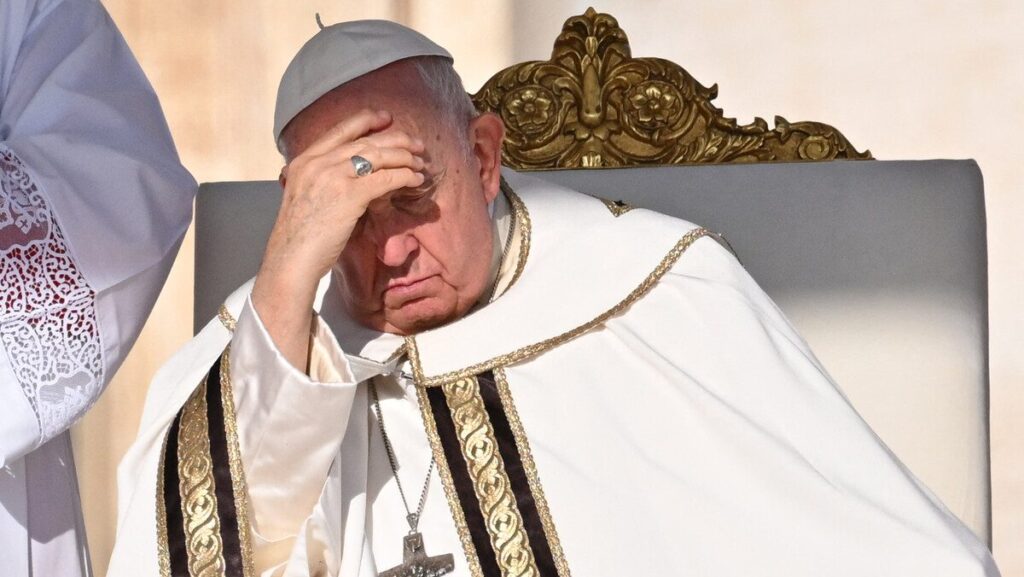
Pope Francis leads a mass on the opening day of the 16th Ordinary General Assembly of the Synod of Bishops, at St Peter’s square in The Vatican, on October 4, 2023.
Photo: Andreas SOLARO / AFP
With just a few days to go before the opening in October of a new phase of the Synod on Synodality, due to be held shortly in Rome, many people within the Catholic Church are expressing their concern about a move that could shake the foundations of the institution.
Five cardinals have sent dubia, or questions, to the Pope asking for clarification on key doctrinal matters. Their contents, and the papal response, have now been made public, but the confusion is only growing.
On July 10th this year, five cardinals—Brandmüller, Burke, Sandoval, Zen and Sarah—sent Pope Francis five dubia asking the pontiff for clarification on the orientations of the forthcoming synod. The topics chosen by the cardinals are among the most representative of the controversies currently shaking the Church. The working document, or Instrumentum laboris, published in June, clearly suggests that these burning issues could be subject to progressive attempts to break with the traditional, 2,000-year-old teaching of the Catholic Church.
The first question concerns the adaptation of the Church’s message to circumstances. The second deals with blessings for same-sex couples. The third questions the relevance of the principle of ‘synodality.’ The fourth deals with the place of women in the Church and the possible ordination of women. The last looks at the conditions of absolution in the sacrament of confession.
On July 11th, Pope Francis made his responses known to the cardinals. It was a lengthy response, drawn up in record time, in which some seasoned Vatican insiders saw the hand of Cardinal Victor Manuel Fernández, recently appointed head of the Dicastery for the Doctrine of the Faith. It was this reply, curiously addressed to only two out of five cardinals, that was made public at the beginning of October—a move that removes its private nature.
The pontifical responses, which were supposed to remove ambiguities, in fact only reinforced them. To begin with, they do not respect the forms usually required to respond to dubia. Canonically, the expected response to questions must be brief—yes or no—so as to avoid tedious theological exposition. Pope Francis chose instead to detail his answers, thus preventing the simple clarification requested by the cardinals. This is not the first time that the Pope has dodged the dubia procedure in this way. In 2016, four cardinals asked him about the controversial encyclical Amoris Laetitia. He simply did not respond.
It is striking to note, on reading the responses published, that they all follow the same pattern. First of all, the editor—whether Pope Francis or his pen, Cardinal Fernández—recalls the Church’s immemorial magisterium and its full validity on controversial subjects. Yes, Catholic doctrine is immutable and does not care about the vicissitudes of the times. Yes, marriage can only apply to the union of a man and a woman.
But then a correction is immediately made: the magisterium is relativised in favour of pastoral imperatives, which open the door to all conceivable accommodations. As the reader becomes familiar with these responses, he discovers style clauses that leave room for all sorts of future interpretations.
On the subject of homosexual unions, for example, the text almost explicitly recognises the validity of certain forms of blessing, even if they do not bear the name of marriage:
“For when a blessing is requested, it is expressing a plea to God for help, a supplication to live better, a trust in a Father who can help us live better.”
On the question of the ordination of women, the text acknowledges, with many oratorical evasions, the possibility of a future evolution in these terms:
“Let us recognise that a clear and authoritative doctrine on the exact nature of a ‘definitive statement’ has not yet been fully developed. It is not a dogmatic definition, and yet it must be adhered to by all. No one can publicly contradict it and yet it can be a subject of study.”
In view of the form and content of the answers sent to the cardinals on July 11th, which did not play their part in clarifying the debate, the cardinals took the liberty of submitting new questions on August 21st, once again requesting an answer in the required form of a short, clear-cut ‘yes or no.’ This new request has so far failed to produce a response.
The concern of the five cardinal signatories is now shared by other members of the high clergy. Since the publication of the papal responses on October 2nd, Cardinal Gerhard Müller and Bishop Athanasius Schneider, who are recognised as the Church’s watchdogs on possible progressive tendencies, have symbolically joined the dubia in supporting and approving them, and are calling on other prelates to lend their support too.
“It is much to be desired that many Cardinals and Bishops, mindful of the solemn promise of their episcopal ordination to defend the integrity of the Catholic Faith, support publicly this witness of the five Cardinals,” said Bishop Athanasius Schneider.
This state of alarm has not escaped Pope Francis, who in turn has expressed his “concern” about the risks of division in the Church. At the consistory ceremony held in Rome on September 30th to appoint new cardinals, the pontiff used the metaphor of an orchestra to explain that harmony had to prevail over dissonance, while recalling his intangible authority as conductor of the orchestra—a balance that is more difficult than ever to maintain.
